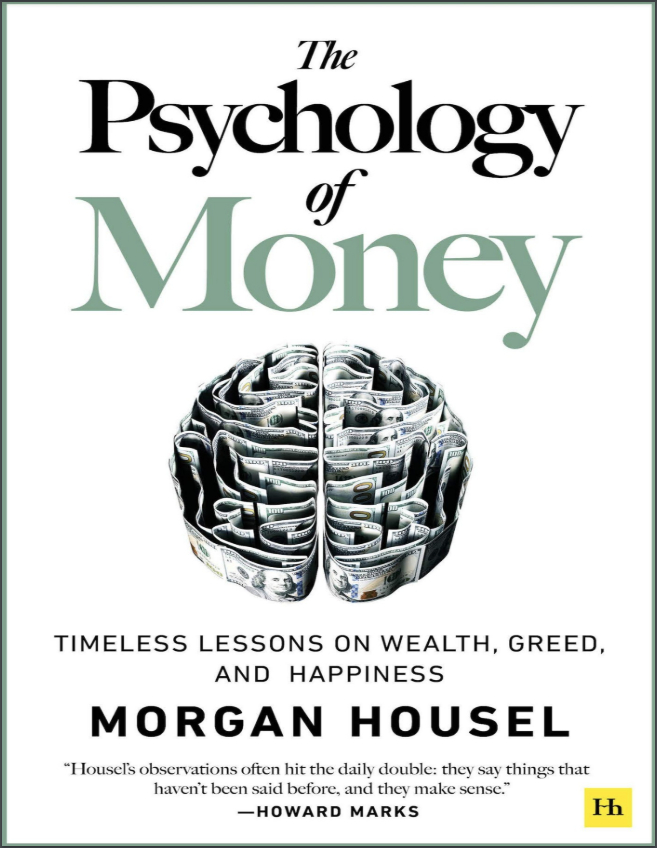It occurs to me that there is room for articles about books that have greatly positive impacts on their readers, and so I will over time produce a series on books that I think are indispensible to serious investors and traders; books that literally expand your critical-thinking skills and rational habits.
First in this series is this one- please enjoy!
In the complex world of finance, where data-driven strategies often dominate discussions, Morgan Housel's "The Psychology of Money" offers a refreshing perspective.
This book is an essential read for anyone seeking to understand the profound role psychology plays in financial success.
As Housel eloquently demonstrates through a series of compelling stories and insightful analyses, the way we think about money is just as crucial as the technical knowledge we possess.
Key Chapters and Concepts
1. No One’s Crazy
Housel opens with the fundamental idea that everyone’s perspective on money is shaped by their unique experiences. What may seem irrational to one person might make perfect sense to another, based on their life story. This chapter sets the tone for the book, encouraging readers to appreciate the diverse motivations behind financial decisions.
2. Luck & Risk
The interplay of luck and risk is explored through the contrasting lives of Bill Gates and his less fortunate friend, Kent Evans. Housel emphasizes that success in investing is not solely about making the right decisions but also about being fortunate enough to be in the right place at the right time. Recognising this can help investors maintain humility and avoid overestimating their control over outcomes.
3. Never Enough
The story of Rajat Gupta, a highly successful businessman whose insatiable desire for more led to his downfall, serves as a cautionary tale. Housel argues that knowing when you have "enough" is a critical skill that can prevent destructive behaviours driven by greed. This chapter is a powerful reminder of the importance of contentment and the dangers of constantly moving goalposts.
4. Confounding Compounding
One of the book’s most enlightening discussions is on the power of compounding. Housel illustrates this through the story of Ronald Read, a janitor who amassed millions by investing small amounts over a long period. The lesson here is simple yet profound: consistent, patient investing can yield extraordinary results over time.
5. Getting Wealthy vs. Staying Wealthy
Housel distinguishes between the skills required to accumulate wealth and those needed to preserve it. He uses historical examples to show that while risk-taking is necessary to get rich, caution and paranoia are essential to stay rich. This duality is crucial for investors to understand and balance in their strategies.
6. Tails, You Win
In this chapter, Housel delves into the concept of "tails" – rare, extreme events that disproportionately impact financial outcomes. He explains how a small number of significant investments or events often drive the majority of results, highlighting the importance of being open to opportunities and recognising the potential of outliers.
7. Freedom
The ultimate goal of financial success, according to Housel, is freedom – the ability to do what you want, when you want, with whom you want. This chapter resonates with many readers, offering a compelling reason to pursue financial independence beyond the accumulation of wealth for its own sake.
8. Man in the Car Paradox
Housel explores the paradox of wealth signals, where people often buy luxury items to impress others, who in turn pay little attention to the owner’s wealth. This insight encourages readers to reconsider their spending habits and focus on what truly brings them happiness and fulfillment.
9. Wealth is What You Don’t See
The book emphasizes that true wealth is often invisible – it's the savings, investments, and financial security that are not immediately apparent. Housel's perspective shifts the focus from outward displays of wealth to the importance of financial stability and preparedness.
10. Save Money
Housel simplifies the complex topic of savings by underscoring its role as the most effective way to build wealth. He argues that saving is about the gap between your ego and your income, and it's something everyone can control, regardless of market conditions or investment performance.
"The Psychology of Money" is more than just a finance book; it's a guide to understanding the emotional and psychological forces that drive our financial decisions.
Housel's storytelling prowess and profound insights make complex concepts accessible and relatable.
For investors seeking to improve not just their portfolios but also their relationship with money, this book is an invaluable resource.
By delving into the psychological aspects of wealth, Housel provides a roadmap to financial success that is grounded in behaviour rather than mere intellect.
It’s a must-read for anyone who wants to navigate the financial world with wisdom and confidence.
Which stock should you buy in your very next trade?
AI computing powers are changing the stock market. Investing.com's ProPicks AI includes 6 winning stock portfolios chosen by our advanced AI. In 2024 alone, ProPicks AI identified 2 stocks that surged over 150%, 4 additional stocks that leaped over 30%, and 3 more that climbed over 25%. Which stock will be the next to soar?
Unlock ProPicks AI


